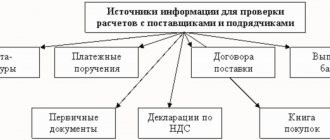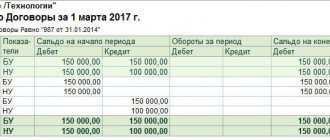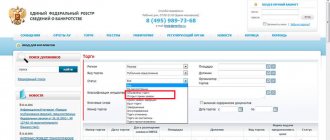27.07.2020
Insolvent Debtors account designed to summarize information about the status of receivables written off at a loss due to the insolvency of sources. This debt must be kept on the balance sheet for 5 years from the date of write-off in order to monitor the possibility of its collection in the event of a change in the debtor’s property status.
Dictionary of business terms. Akademik.ru. 2001.
See what “Account 007 Indebtedness of Insolvent Debtors Written Off at a Loss” is in other dictionaries:
- Dictionary of business terms
ACCOUNT 007 WRITTEN OFF AS A LOSS DEBT OF INSOLVENT DEBBITORS, OFF-BALANCE SHEET
- an account intended to summarize information about the status of receivables written off at a loss due to the insolvency of sources. This debt must be taken into account on the balance sheet for 5 years from the date of write-off for... ... Large economic dictionary
007 account
— Account 007 “Debt of insolvent debtors written off at a loss” is intended to summarize information about the state of receivables written off at a loss due to the insolvency of debtors. This debt should... ... Accounting Encyclopedia
Chart of accounts
— a system of accounting accounts, providing for their number, grouping and digital designation depending on the objects and purposes of accounting. The Chart of Accounts includes synthetic accounts of the first order and subaccounts or accounts of the second order.... ... Accounting Encyclopedia
Chart of accounts is a system of accounting accounts, providing for their number, grouping and digital designation depending on the objects and purposes of accounting. The Chart of Accounts includes both synthetic (first order accounts) and related ones... ... Wikipedia
An entry on the credit of off-balance sheet account 007 is also made if:
- the 5-year period for recording this information has expired;
- The debtor organization has been liquidated.
Inventory of objects recorded on account 007 The need for an inventory has already been discussed in the article. The organization must check the condition of all its property. Including property that does not belong to her, but is listed in the accounting records, as well as property that is not taken into account for any reason. Thus, all off-balance sheet accounts are subject to inventory, including. In what order is the inventory of assets taken off-balance sheet carried out, what are the specifics of the inventory of these objects, see the article “Is it possible to carry out an inventory for off-balance sheet accounts?”
What is transferred to off-balance sheet account 007?
Write-off receivables must be reflected for 5 years on off-balance sheet account 007 in accordance with accounting legislation. Does this requirement apply when writing off debt for bankrupt enterprises, if the debt was written off on the basis of an extract confirming the exclusion of the debtor from the Unified State Register of Legal Entities?
The procedure for accounting by an organization of accounts receivable on account 007 is regulated by: - Order of the Ministry of Finance of the Russian Federation dated July 29, 1998 N 34n “On approval of the Regulations on maintaining accounting and financial reporting in the Russian Federation” - hereinafter Order N 34n; — By order of the Ministry of Finance of the Russian Federation dated October 31, 2000.
N 94n “On approval of the Chart of Accounts for accounting of financial and economic activities of organizations and instructions for its application” - hereinafter Order N 94n; — Accounting policy of the organization. In accordance with paragraph.
Reviews and wishes
10/29/2020 09:07 Feedback on the seminar 10/19/2020 Thank you for the material provided and the opportunity to enjoy the presentation of information. Sincerely, Chistyakova O.A. Read more…
10.18.2020 19:12 About the on-site seminar in Gelendzhik in September 2020. From the St. Petersburg group we express our deep gratitude to the organizer of this seminar - Svetlana Vyacheslavovna Baldina! This year, due to quarantine, the seminar took place in September instead of planned... Read more...
04/10/2020 14:36 Thank you for your work! You help us a lot in our work! Hello! I would like to thank the Center for Financial Expertise for organizing the seminar on 04/09/2020 online. Prompt, complete and structured information was received from all experts… Read more…
04/10/2020 09:35 Thank you for the seminar! Thanks for the seminar! Read more…
04/10/2020 09:31 Thank you very much for the webinar! Thank you very much for the webinar! Sincerely, Matvey Kurashov Read more...
Guest book
Account 007 “debt of insolvent debtors written off at a loss”
Conclusion During the liquidation of an organization, there are no accounting objects (debt, debtor) to be reflected in off-balance sheet account 007 “Debt of insolvent debtors written off at a loss”, therefore there is no basis for the formation of appropriate accounting records. According to paragraph 8 of Art. 22 of the Federal Law of 08.08.2001
N 129-FZ “On state registration of legal entities and individual entrepreneurs”: “The exclusion of an inactive legal entity from the unified state register of legal entities may be appealed by creditors or other persons whose rights and legitimate interests are affected in connection with the exclusion of an inactive legal entity from the unified state register.” register of legal entities, within a year*(1) from the day when they learned or should have learned about the violation of their rights.”
How to write off bad receivables
Add to favoritesSend by email Off-balance sheet account 007 - “Debt of insolvent debtors written off at a loss.” What a balance sheet account is, how to work with it, what information is collected on account 007 and in what cases records are kept on it, you can find out in this article.
Attention
General characteristics of an off-balance sheet account Accounting on an off-balance sheet account 007 Inventory of objects recorded on account 007 Results General characteristics of an off-balance sheet account As a result of the organization's activities, assets appear that do not belong to it, but are listed for a period of temporary use or storage. Off-balance sheet accounts are designed to account for this type of asset.
Their accounting is determined by the Chart of Accounts and instructions thereto, approved by Order of the Ministry of Finance dated October 31, 2000 No. 94n.
Results
Off-balance sheet account 007 “Debt of insolvent debtors written off at a loss” is provided for in the Chart of Accounts.
It is designed to collect information about all written-off receivables for the purpose of possible collection. This information is taken into account on the balance sheet for 5 years from the date of write-off. Accounting is kept separately for each debtor and reason. While the debt is listed on an off-balance sheet account, the organization must monitor changes in the debtor’s property status. You can find more complete information on the topic in ConsultantPlus. Free trial access to the system for 2 days.
Write-off of accounts receivable in accounting and tax accounting.
The basis for declaring an act of the registration body on the exclusion of an inactive legal entity from the Register invalid is the inconsistency of this act with the law, other legal acts and its violation of the rights and legally protected interests of a citizen or legal entity (Article 13 of the Civil Code of the Russian Federation). Thus, if, in the process of claims work, the legal services of the organization (or other persons) invalidate the act of the registering authority on the exclusion of a legal entity from the Unified State Register of Legal Entities, the relevant documents must be transferred to the accounting department of the organization. Based on the specified documents in the organization’s accounting, accounts receivable that were previously written off in connection with the liquidation of the debtor are subject to restoration.
Account postings 07
Let's move on to the description of the entries in account 07 “Equipment for installation”. We list the main transactions when choosing a method of purchasing equipment (debit/credit):
- 07/20 - equipment manufactured by the organization itself;
- 07/75 - equipment is the founders’ contribution to the authorized capital;
- 07/60 (76) - equipment purchased from third parties or individuals;
- 07/79 - technical devices arrived from a branch of the organization;
- 07/86 - targeted financing for the purchase of equipment.
Other important postings include:
- 19/60 - reflection of VAT when purchasing equipment;
- 08/07 — account closure, transfer of equipment for installation;
- 08/76 (10, 23, 70) - installation by the organization;
- 03/08 - the equipment is ready and put into operation on the basis of the OS-1 act, that is, it is taken into account as a fixed asset. The technique carried out in this way is part of the organization's asset.
Equipment is written off from account 07 in the event of sale, donation, irreparable breakdown, etc. In this case, the following entries are made:
- 79 (80)/07 - transfer of equipment to a branch of the organization;
- 91.02/07 - sale (donation);
- 94/07 - write-off due to a malfunction.
Account 007 “debt of insolvent debtors written off at a loss”
ACCOUNT 007 “WRITTEN OFF AT A LOSS DEBT OF INVOLVED DEBBITORS” Account 007 “Written off debt of insolvent debtors at a loss” is intended to summarize information on the state of receivables written off at a loss due to the insolvency of debtors. This debt must be kept on the balance sheet for five years from the date of write-off to monitor the possibility of its collection in the event of a change in the property status of the debtors.
For amounts received in order to collect debts previously described at a loss, accounts 50 “Cash”, 51 “Cash Accounts” and 52 “Currency Accounts” are debited in correspondence with account 91 “Other income and expenses”. At the same time, off-balance sheet account 007 “Debt of insolvent debtors written off at a loss” is credited for the indicated amounts.
Info
Legally, this period is 3 years. This debt is defined as bad debt and is written off either through the reserve for doubtful debts or through other expenses. Bad debt is written off in the presence of an inventory report and an order from the manager.
You can learn more about the procedure for writing off receivables in the article “Procedure for writing off receivables.” According to accounting rules, data on debtors and their amounts should not be lost during the period when this information is written off. The debt must remain stored off the balance sheet for another 5 years from the date of write-off in order to restore it in the event of a change in the financial situation of the debtor. For this purpose, account 007 “Debt of insolvent debtors written off at a loss” is intended.
Important
The peculiarity of off-balance sheet accounts is that the amounts for business transactions are not cross-registered in the debit of one and the credit of another account, but are recorded only in the debit or credit of such an account. You can find out about which accounts are called off-balance sheet and what regulatory documents establish the accounting procedure for them in the article “Rules for maintaining accounting on off-balance sheet accounts.”
Accounting on off-balance sheet account 007 Each enterprise must conduct an inventory of property, receivables and payables. An inventory must be carried out once a year before the preparation of financial statements or more often - in accordance with the applicable accounting policies.
During the inventory, receivables that need to be written off are often identified, namely debts that are unrealistic for collection, receivables for which the statute of limitations has expired.
New topics on the forum
01/26/2021 16:57 USN Hello! An organization using the simplified tax system (income-expenses) rents premises from an individual in the amount of 25,000-00, and transfers the rent to the individual minus personal income tax 21,750-00. Question: you can include all... Read more...
01/26/2021 16:57 USN Hello! An organization using the simplified tax system (income-expenses) rents premises from an individual in the amount of 25,000-00, and transfers the rent to the individual minus personal income tax 21,750-00. Question: you can include all... Read more...
01/25/2021 16:21 Reduced insurance premium rates for OKVED 72.1 Alexey Alexandrovich, good afternoon. LLC on the simplified tax system, belongs to SMEs with OKVED-72.1 (Scientific research and development in the field of natural and technical work) did not enjoy preferential insurance rates... More details...
01/24/2021 20:59 CTS to gas turbine engines of previous years Good afternoon! In 2021 the goods were imported and VAT was deducted. Later it turned out that Customs made a technical error (VAT was taken from a higher value) and for several years we wrote letters to … Read more…
01/20/2021 10:28 Who is handing over the invoice register Alexey Alexandrovich, good afternoon. Please tell me: 1. in the 4th quarter of 2020, the organization applied a benefit based on the volume of revenue - not a VAT payer 2. another organization is exempt from paying VAT - services for... Read more...
All topics
On the off-balance sheet account 007 the debt is written off, 5 years have passed, how to remove it
Order No. 34n: “Receivables for which the statute of limitations has expired, and other debts that are unrealistic for collection, are written off for each obligation based on the inventory data, written justification and order (instruction) of the head of the organization and are charged accordingly to the reserve for doubtful debts or for the financial results of a commercial organization, if in the period preceding the reporting period, the amounts of these debts were not reserved in the manner prescribed by paragraph 70 of these Regulations, or for an increase in expenses for a non-profit organization. Writing off a debt at a loss due to the debtor's insolvency does not constitute cancellation of the debt.
The organization's accounting policy may regulate additional features of analytical accounting, for example, separate accounting of various types of debts: by the basis of occurrence, by date of occurrence, etc. Conclusion In accordance with accounting regulations, accounting in off-balance sheet account 007 implies: A) the presence of a debtor; B) presence of debt; C) the presence of potential debt collection.
According to Art. 419 of the Civil Code of the Russian Federation, upon the liquidation of a legal entity, the obligation is terminated, except in cases where the law or other legal acts assign the fulfillment of the obligation of the liquidated legal entity to another person (for claims for compensation for harm caused to life or health, etc.). Because Account 007 “Debt of insolvent debtors written off at a loss” is intended to summarize information on the status of receivables written off at a loss due to the insolvency of debtors. This debt must be kept on the balance sheet for five years from the date of write-off to monitor the possibility of its collection in the event of a change in the property status of the debtors. For amounts received in order to collect debts previously written off at a loss, accounts 50 “Cash”, 51 “Cash Accounts” or 52 “Currency Accounts” are debited in correspondence with account 91 “Other income and expenses”. At the same time, off-balance sheet account 007 “Debt of insolvent debtors written off at a loss” is credited for the indicated amounts.
Accounting for this debt is carried out separately for each debtor and reason. During the period of recording written-off receivables on an off-balance sheet account, it is necessary to monitor changes in the debtor’s property status in order to identify the possibility of debt repayment.
In case of repayment of debt previously written off at a loss, cash accounts are debited in correspondence with the other income account. At the same time, an entry is made: Kt 007. Thus, the entries will be as follows: Dt 50 (51, 52) Kt 62 (58, 60, 76) - money received from the debtor D 62 (58, 60, 76) K 91 - credited to income a debt that has been repaid. Kt 007 - the returned debt is removed from the off-balance sheet account.
Accounts receivable for which the statute of limitations has expired must be written off as the organization's losses (clause 77 of the Regulations on accounting and reporting in the Russian Federation, approved by order of the Ministry of Finance of Russia dated July 29, 1998 No. 34 n.)
In general, accounts receivable are written off at a loss after the statute of limitations expires. In accordance with Art. 196 of the Civil Code of the Russian Federation, it is three years. However, this requirement currently only applies to claimed receivables. And precisely the one for which the creditor organization did everything to ensure that it was repaid. By the way, the tax authorities believe that a necessary condition for recognizing a receivable as reclaimed is for the creditor to file a claim in court.
In other cases, receivables (which are considered unclaimed) must be written off as losses after four months from the date of actual receipt of goods (work, services) by the debtor.
But in any case (both when writing off claimed and when writing off unclaimed receivables), over the next five years it must be reflected on the balance sheet. This is what account 007 is intended for. This is done in order to monitor the debtor’s property situation: perhaps after some time he will still pay off his debt.
Analytical accounting is maintained for each debtor whose debt is written off at a loss, and for each debt written off at a loss.
Comments
01/14/2021 16:56 RE: Map of the day January 15, 2021: SZV-M, SZV-TD, salary contributions and taxes - according to new details! Good afternoon. Thanks a lot! Sincerely, Tatyana Borisovna Fedorova Chief Accountant Read more…
01/14/2021 10:47 Thank you! Thanks a lot! Read more…
04/03/2020 16:50 Many thanks to you and your colleagues for prompt notification and commenting. Hello, Svetlana Vyacheslavovna! Many thanks to you and your colleagues for promptly notifying and commenting on the constantly changing situation. And especially for attention to the problems of SMEs and priests... Read more...
04/03/2020 13:54 We also have wishes to expand the affected activities Hello! We very much support your proposals for amendments, we began to think through independent steps in this direction, and your newsletter turned out to be very timely. We are a medical organization... Read more...
03/31/2020 14:37 Comments on the news 03/31/2020 Svetlana Vyacheslavovna, thank you. Wonderful to see and hear. Thank you very much again! Read more…
All comments
Dt 91-2 Kt 62 (76) - accounts receivable written off;
Dt 007 —
the debt of the insolvent debtor is reflected;
When writing off debt from off-balance sheet accounting after 5 years, the following entry is made:
Kt 007 - the debt is written off from off-balance sheet accounting.
The debt of an insolvent debtor can be written off from account 007 before this period. This happens in two cases:
- the debtor has repaid the debt;
The debtor organization has been liquidated.
In January 2007 Sigma CJSC supplied a batch of its own products to Renk LLC. The cost of these products, according to the contract, is 89,115 rubles. (including VAT - 13,594 rubles) Payment period for products is March 2008.
However, by March the products had not been paid for due to the insolvency of the buyer (Renk LLC), although Sigma CJSC went to court.
In January 2010, i.e. after the expiration of the limitation period, the following entries were made in the accounting records of Sigma CJSC:
Dt 91-2 Kt 62 89 115 rub. – the claimed receivables are written off at a loss after the expiration of the limitation period;
Dt 007 89 115 rub. – the amount of written off claimed receivables is reflected on the balance sheet.
In January 2015 (if the debt is not repaid before this date), the organization will need to write off the amounts of outstanding receivables from off-balance sheet accounting by making the following entry:
Kt 007 89 115 rub. – the amount of outstanding receivables is written off off-balance sheet.
Main purpose
Off-balance sheet account 007 contains information on bad debts of counterparties who received services or goods from the enterprise written off at a loss within 5 years after the expiration of the statute of limitations.
Analytics is systematically carried out for each case of debt write-off separately. It is necessary to monitor the state of the defaulter’s financial affairs: perhaps the debtor will still pay off his debt.
In order for debt obligations to be written off in full, an explanatory note to the accounting is required, which provides a detailed description of the ongoing collection of information about the possibility of repaying the debt to the enterprise.
The entire write-off process is carried out after the inventory count and on the basis of the manager’s order.
Accounts receivable fall off the balance sheet of the organization after it is identified during the inventory process, which is carried out every 3 months.
Then the company must take all legal measures to return the funds and only after that transfer the debt as an entry to 007.
So, the transfer of debts to 007 occurs after the following events:
- expiration of the limitation period, which in standard cases lasts 3 years, and in some cases even less (according to the individual terms of the contract);
- receiving a court decision confirming the debtor's insolvency.
If the written off debt is not repaid within 5 years, account 007 is credited.









